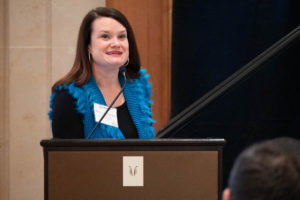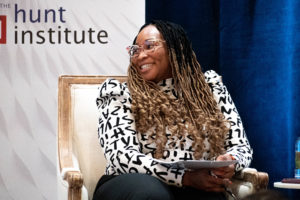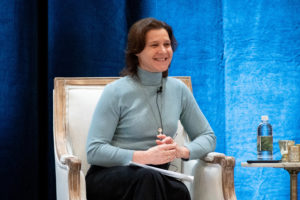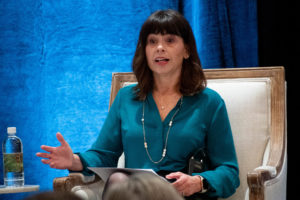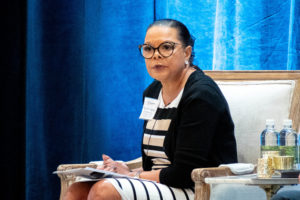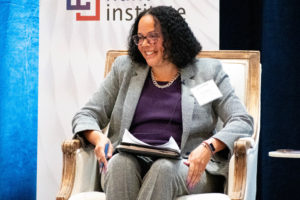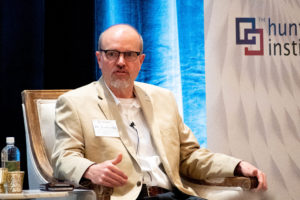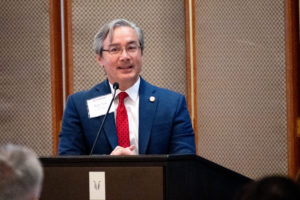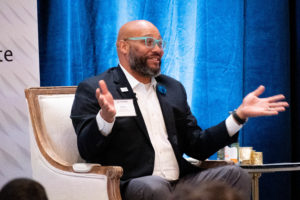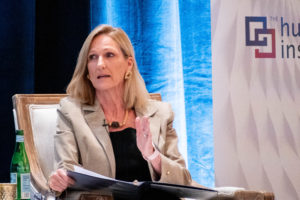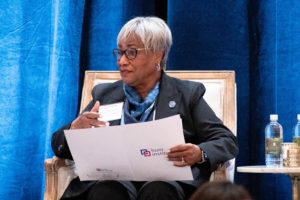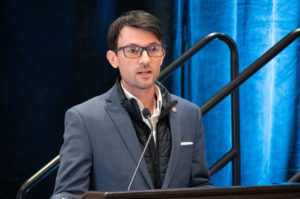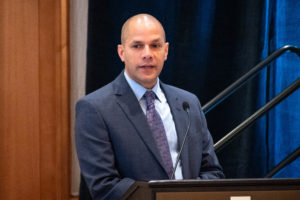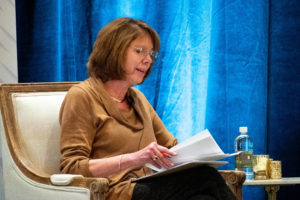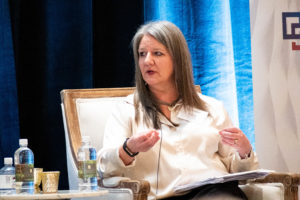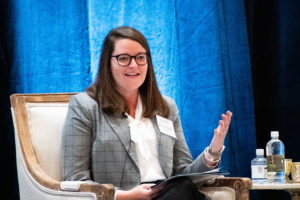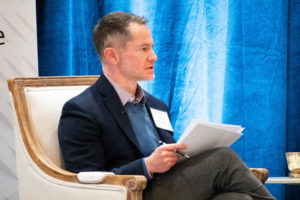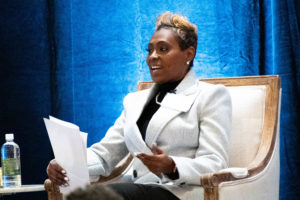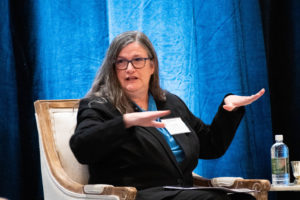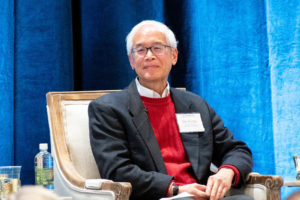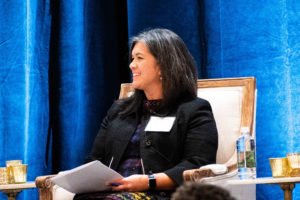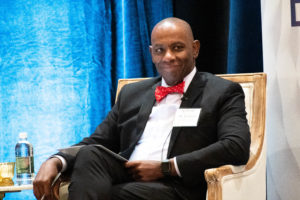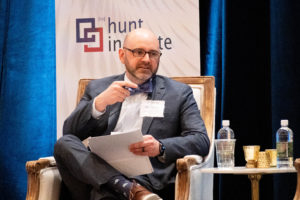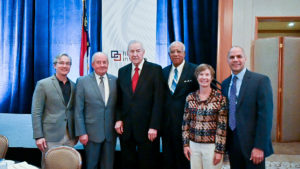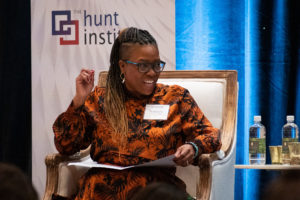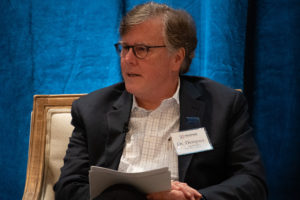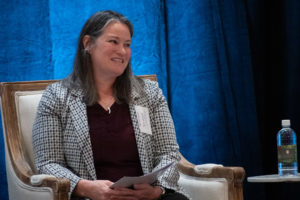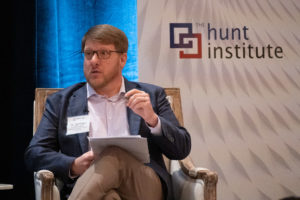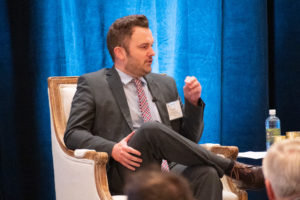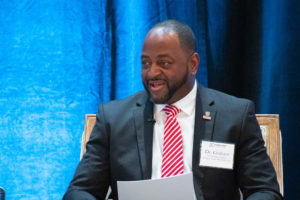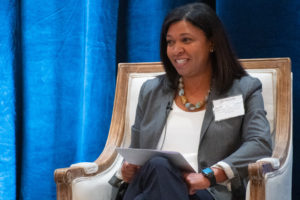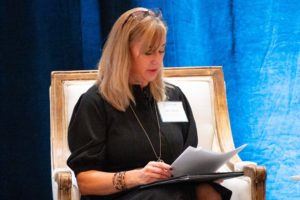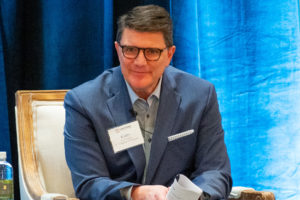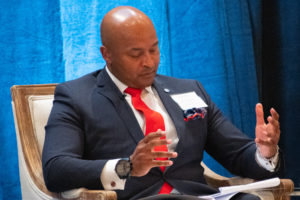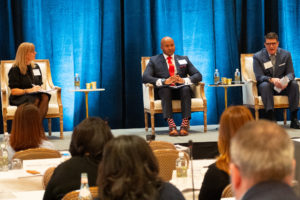2023 Holshouser Legislators Retreat
February 2, 2023
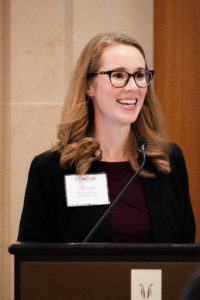 Before the Retreat officially began, we kicked off the day with our Education Policy Bootcamp, which gave newly elected officials a foundation understanding of education policy in North Carolina.
Before the Retreat officially began, we kicked off the day with our Education Policy Bootcamp, which gave newly elected officials a foundation understanding of education policy in North Carolina.
The first session, titled “North Carolina’s Early Childhood Landscape,” focused on the brain science of early learning, North Carolina’s system of early childhood education, and the state of the early childhood workforce. After an introduction from Representative Ashton Clemmons, Dr. Iheoma Iruka, Research Professor & Fellow with the Department of Public Policy at UNC Chapel Hill, moderated the discussion with Dr. Elizabeth Cuervo Tilson, State Health Director and the Chief Medical Officer at the NC Department of Health and Human Services, and Susan Perry, Chief Deputy Secretary for Opportunity and Well-Being, NC Department of Health and Human Services.
Legislators then heard from Dr. Maria Pitre-Martin of North Carolina State Board of Education and Dr. Tom Tomberlin, the Senior Director of the Office of Educator Preparation and Teacher Licensure with NC Department of Public Instruction. This session highlighted North Carolina’s K-12 landscape, including types of educational settings, current opportunities and challenges that exist, and the state of our educator workforce. The session was moderated by Jevelyn Bonner-Reed, Executive Director, The Belk Foundation, and introduced by Senator Michael Lee.
The final session of the morning was introduced by Representative Jon Hardister and moderated by Jairo McMican, the Associate Director of Equity Initiatives at Achieving the Dream. This session, titled “Postsecondary Education and Attainment,” described access to postsecondary education in North Carolina including barriers to entry and attainment, and opportunities to support the transition to postsecondary settings. Panelists included Cecilia Holden, President & CEO of myFutureNC, and Dr. Christine Johnson McPhail, President, St. Augustine’s University.
After a networking lunch, the rest of the weekend’s attendees arrived at The Umstead ready to start the 20th Annual Holshouser Legislators Retreat.
First up, Representative Ashton Clemmons introduced Susan Gates, Special Advisor on Education Initiatives at SAS, who moderated conversation with The Honorable Samara Heavrin of Kentucky and Linda Parsons, President and CEO of Moore County Chamber of Commerce, on current access to care and learning in North Carolina and ways in which businesses and communities can work together to strengthen access.
Senator Sydney Batch then took the stage to introduce a panel titled “North Carolina’s Early Childhood Workforce.” Rob Thompson, Director of Early Childhood for the Blue Cross Blue Shield NC Foundation, moderated this conversation which featured Cyndie Osborne, Early Childhood Education Program Head at Stanly Community College, and Karen Smith-Jones, Owner and Executive Director at Nana’s Place Learning Center. Policymakers learned about the current workforce landscape and strategies for increasing the pipeline of well-compensated, excellent early childhood educators in North Carolina.
After a short break, NC Superintendent Catherine Truitt introduced Dr. Michael Maher, the Deputy Superintendent of Standards, Accountability, and Research with the NC Department of Public Instruction, who moderated a session on building impactful accountability systems. This session, which discussed the role of the General Assembly in creating this framework, featured Dr. Brian Gong, Senior Associate for the Center for Assessment, Dr. Anthony Jackson, Superintendent for Chatham County Schools, and Dr. Diana Lys, Assistant Dean for Educator Preparation and Accreditation at UNC Chapel Hill.
Before we closed out Day One of the Retreat, we were honored to hear from Dr. Jim Goodnight, the Co-Founder and CEO of SAS, and The Honorable Howard Lee, who currently serves as Secretary of our Board of Directors at The Hunt Institute. Alongside our President and CEO, Dr. Javaid Siddiqi, Dr. Goodnight and The Honorable Howard Lee provided closing remarks for the day and celebrated 20 years of hosting the Retreat.
Day two started strong with a session moderated by LaTanya Pattillo, Director of Policy and Advocacy at NWEA featuring Dr. Van Dempsey, Dean at Watson College of Education at UNC Wilmington, Dr. Matthew Springer, Hussman Distinguished Professor of Education Reform at the School of Education at UNC Chapel Hill, and Maureen Stover, the 2020 Burroughs Wellcome NC Teacher of the Year. The session, titled “Educator Licensure Reform, focuses on North Carolina’s efforts to reform teacher licensure in order to recruit, and retain a highly qualified and diverse teaching workforce for all children. Senator Sydney Batch provided opening remarks.
Representative Jon Hardister then introduced David Donaldson, Founder and Managing Partner, National Center for Grow Your Own, who moderated a discussion on expanding the educator pipeline through teacher residencies. Resource experts Dr. Kathlene Holmes Campbell, Chief Executive Officer at National Center for Teacher Residencies, and Dr. Anthony Graham, Provost and Vice Chancellor of Academic Affairs at Winston-Salem State University and Chair, discussed states have approached adopting teacher preparation pathways and the role the General Assembly plays in creating opportunities for prospective teacher candidates to seek this route.
We were then honored to host and hear from Governor Roy Cooper, who underscored the importance of teachers and principals in order to give every student a quality education. We’re incredibly grateful to Governor Cooper for his continued leadership and support at The Hunt Institute.
For the final session of the Holshouser Legislators Retreat, Representative Jon Hardister introduced Dr. Annie Izod, Executive Director of NCWorks Commission, who moderated a discussion with Gary Salamido, President and CEO of the NC Chamber of Commerce and Dr. Johnny Smith, Vice President of Strategic Initiatives and Community Engagement at Pitt Community College. This session explored North Carolina’s current workforce needs and opportunities to increase postsecondary attainment.

